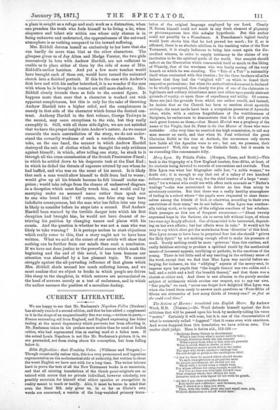Mary Lyon. By Fidelia Fiske. (Morgan, Chase, and Scott.)—This book
is the biography of a New England teacher, four-fifths, at least, of its contents being devoted to records of conversions and revivals. That Miss Lyon was what her biographer calls her, "a noble woman," we doubt not ; it is enough to say that out of a salary of two hundred dollars—scanty pay, by the way, for the chief teacher of a large "semi- nary," for a woman who could use with effect such manuals as "Butler's Analogy "—she was accustomed to devote no less than ninety to missionary societies. But that there was a really healthy atmosphere of feeling in a school where "the pupils were requested to class them- selves among the friends of God, or otherwise, according to their own convictions of their state," we do not believe. Miss Lyon was continu- ally taking stock, so to speak, of the religious emotions of her scholars. Such passages as this are of frequent occurrence :—" About twenty expressed hope in the Saviour, six or seven left without hope, of whom two were not deeply affected. One of them tried to be interested, depend- ing on her own efforts ; but her efforts wore in vain." It would not be easy to say which class got the more harm from direction ' of this kind. Miss Lyon seems to have been in perpetual fear lest she should "grieve the Holy Spirit" by not making enough effort to make his presence of avail. Surely nothing could be more ' grievous ' than this restless, and really faithless striving to produce a spiritual result by the mechanical means of incessant appeals, terrifying or pathetic, to the emotions of the young. There is but little said of any teaching in the ordinary sense of the word, except that we find that Miss Lyon was careful before en- larging, for instance, on the " edifying " aspects of the mercy-seat, to impress upon her pupils that "the length thereof was two cubits and e. half, and a cubit and a half the breadth thereof," and that there was a cherub at either end. And there is one allusion to the purely secular subject of arithmetic which excites our respect, not to say our awe. "Her pupils," we read, "never can forget how delighted Miss Lyon was when she found them ready to answer suoh questions as Four-fifths of fifteen are sixteenths of how many thirds of twenty-one ?' as fast as she could read them."


































 Previous page
Previous page